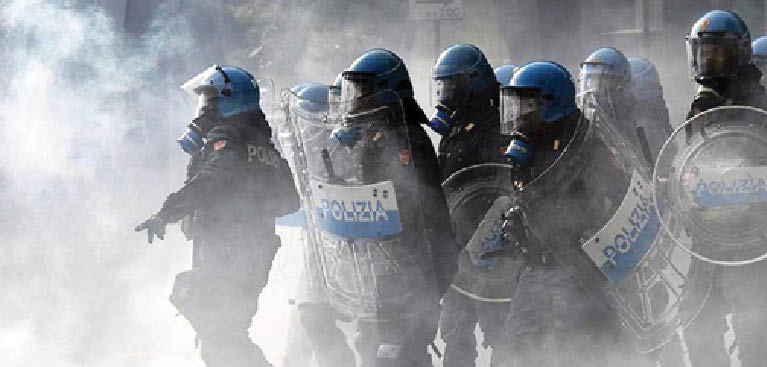Italy fails to swiftly respond to police assault on journalist
Almost a month after Italian journalist Stefano Origone was brutally beaten by police in Genoa, investigations into the incident appear to be stalling, while information about it remains classified. Origone, a Genoa-based journalist with the daily La Repubblica, was covering an antifascist protest on May 23 when half a dozen policemen rushed toward him, pushed […]

Riot police take position during clashes with anti-fascist counter-demonstrators at the same time as the meeting of far-right movement CasaPound is held in Genoa, Italy on May 23 2019.
Almost a month after Italian journalist Stefano Origone was brutally beaten by police in Genoa, investigations into the incident appear to be stalling, while information about it remains classified.
Origone, a Genoa-based journalist with the daily La Repubblica, was covering an antifascist protest on May 23 when half a dozen policemen rushed toward him, pushed him to the ground and began kicking and punching him.
“They wouldn’t stop,” Origone said after the attack, adding that he kept shouting that he was a journalist. The assault came to an end only after a police inspector, who knew Origone personally, intervened, forcing the officers off the journalist.
Origone was rushed to the emergency room at the Galliera Hospital in Genoa, where he received treatment for two broken fingers, cranial trauma, a broken rib, and wounds throughout his body. Weeks later he has yet to fully recover and will most likely need secondary operations.
Following the incident, Genoa’s prosecutor office opened an investigation into the group of policemen who assaulted Origone. Four of them have since come forward voluntarily and are being interrogated.
Further details are not available as documents related to the investigation remain classified. A representative of La Repubblica told the International Press Institute (IPI), “It’s a process that won’t be over any time soon”.
IPI, the global network of editors, journalists and media executives for press freedom, has condemned the attack and called for swift and thorough investigations aimed at ensuring that those responsible are held accountable and that such an event is not repeated.
“The failure of the Italian government to forcefully condemn this episode of police violence and the delay and lack of transparency in the investigation process are sending the message that attacks against journalists are condoned, which is greatly disturbing,” IPI Executive Director Barbara Trionfi commented.
In an official statement almost two weeks after the attack, Luigi Gaetti, Undersecretary of the Interior, explained that Origone was simply in the wrong place at the wrong time, claiming that he was “not recognizable” as a journalist and therefore mistaken for a violent protestor by police. Following Gaetti’s statement, a representative of the opposition Democratic Party, Raffaella Paita, said, “We expected condemnation of the incident, but instead we are confronted with hostility towards journalism.”Stefano Corradino, director the press freedom organization, Articolo 21, told IPI that “the explanation that he was not recognizable as a journalist just doesn’t hold up”.
“Police should be able to effectively verify who is a violent protestor, causing chaos, and who instead is participating peacefully as an observer.
Often police officers act indiscriminately,” Corradino noted. “Origone’s case is even more serious because instead of allowing him to do his job, and cover the demonstration, he was barbarously beaten. It should not have happened. “Echoing Corradino’s position, Giuseppe Francaviglia, director of the Italian online newspaper The Vision, called the notion that Origone, who repeatedly yelled that he was a journalist, was not identifiable as a member of the press “absolutely absurd”.
Attacks and threats against journalists in Italy, typically at the hands of the mafia and representatives of neo-fascist groups, have been increasing, according to the 2019 Annual Report by the Partner Organisations to the Council of Europe’s Platform for Safety of Journalists, which includes IPI. The report also notes a “rhetoric particularly hostile to the media and journalists” regularly expressed by the government’s two deputy prime ministers, Luigi Di Maio and Matteo Salvini. (IPI)
